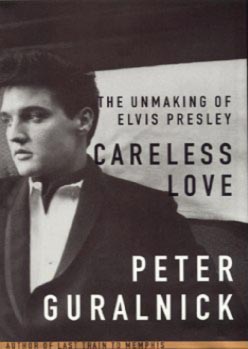

By Peter Guralnick (1998)
Review
In the latter part of his life Elvis
Presley was often heard saying "Walk a Mile In My Shoes" (The title of a 1969
Joe South tune recorded by Elvis in February 1970). Any biography has to accomplish this
to be effective. It must take the reader and place him/her in the time and place that the
story is set in.
Guralnick's first part of the Elvis biography, "Last Train To
Memphis" accomplished this triumphantly, but does this second part do the same?
Yes, to a point.
It was easier to identify with the Elvis Presley as presented in the
first book because he was so much like us (one of the main reasons for his appeal in the
first place). It is harder in the second book to do the same, simply because Elvis is
nothing like anyone you have ever met or will ever meet (the reason for his mythic status
today).
The Book begins with Elvis' army hitch then moves thru the sixties
movie years with intricate detail into the goings on behind the scenes with the Movie
Studios and the Music Publishing Companies. It also delves into the erratic mood swings
that begin to show the dents in Elvis' armour.
In previous books, such as Albert Goldman's ELVIS, the bad temper, drug
intake and stories of excess dominate the pages without ever humanising Elvis for us. This
is Guralnick's triumph, he gives the Elvis story perspective and feeling. He tells us of a
man who is complex, yet childlike, unwilling to stand up to those in control, but exacting
control over his underlings to mask his insecurities.
The last half concerns Elvis in the 1970's. This is easily the most
difficult period in Elvis' life and could easily have been written in episodic,
nondescript fashion, such as, Elvis took lots of drugs ,behaved weirdly and died on a
toilet.
But, again Guralnick humanises Elvis and tells the story in such a way
that the reader becomes non-judgemental but sees the problems from outside that Elvis
faced, along with the ones that he created himself, but never took responsibility for.
One thing that the writer succeeds at most is creating for the reader
the vacuum, reclusive world Elvis created for himself. There are no reference points in
the story, the JFK assassination, the political unrest of the 1960's, Martin Luther King's
assassination, the walk on the moon. These are very rarely mentioned. This is not to say
that Elvis didn't know about
them, he watched the news and was a voracious reader, but it is done to paint the picture
of how Elvis lived. In a vacuum, having someone else do everything for him. creating a
world that he could control, no-one else.
Anyone who reads this book knows going in that it might be a difficult
read as the story does end tragically. But it is only the last part of the book (covering
1974 -1977) that the book loses some focus, just as Elvis' life did . The chapters
covering January 1975 to August 1977 don't seem to have the same attention to detail the
rest of the book has.
All in all, CARELESS LOVE is a worthy follow-up to LAST TRAIN TO
MEMPHIS
and they will be the standard to which any book on Elvis will be measured.
by Anthony Britch (March 1999)
![]()
![]()
![]()
![]()
![]()
Back to Book Reviews